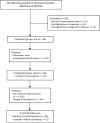Feasibility of a blended group treatment (bGT) for major depression: uncontrolled interventional study in a university setting
- PMID: 29530905
- PMCID: PMC5857649
- DOI: 10.1136/bmjopen-2017-018412
Feasibility of a blended group treatment (bGT) for major depression: uncontrolled interventional study in a university setting
Abstract
Objective: This study investigated the feasibility of a novel blended (face-to-face and computer-based) group intervention for the reduction of depressive symptoms in major depression.
Design: Patient-centred uncontrolled interventional study.
Setting: University setting in a general community sample. A multimodal recruitment strategy (public health centres and public areas) was applied.
Participants: Based on independent interviews, 26 participants, diagnosed with major depressive disorder (81% female; 23% comorbidity >1 and 23% comorbidity >2), entered treatment.
Intervention: Acceptance and mindfulness based, as well as self-management and resource-oriented psychotherapy principles served as the theoretical basis for the low-threshold intervention. The blended format included face-to-face sessions, complemented with multimedia presentations and a platform featuring videos, online work sheets, an unguided group chat and remote therapist-patient communication.
Main outcome measures: The Center for Epidemiological Studies-Depression scale and the 12-item General Health Questionnaire.
Results: Large to very large within group effect sizes were found on self-reported depression (F(2, 46.37)=25.69, p<0.001; d=1.80), general health (F(2,46.73)=11.47, p<0.001; d=1.32), personal resources (F(2,43.36)=21.17, p<0.001; d=0.90) and mindfulness (F(2,46.22)=9.40, p<0.001; d=1.12) after a follow-up period of 3 months. Treatment satisfaction was high, and 69% ranked computer and multimedia use as a therapeutic factor. Furthermore, participants described treatment intensification as important advantage of the blended format. Half of the patients (48%) would have preferred more time for personal exchange.
Conclusion: The investigated blended group format seems feasible for the reduction of depressive symptoms in major depression. The development of blended interventions can benefit from assuring that highly structured treatments actually meet patients' needs. As a next step, the intervention should be tested in comparative trials in routine care.
Trial registration number: DRKS00010894; Pre-results.
Keywords: blended group therapy; blended therapy; depression; group therapy; online interventions; therapeutic factors.
© Article author(s) (or their employer(s) unless otherwise stated in the text of the article) 2018. All rights reserved. No commercial use is permitted unless otherwise expressly granted.
Conflict of interest statement
Competing interests: None declared.
Similar articles
-
Effectiveness of blended depression treatment for adults in specialised mental healthcare: study protocol for a randomised controlled trial.BMC Psychiatry. 2016 Apr 21;16:113. doi: 10.1186/s12888-016-0818-5. BMC Psychiatry. 2016. PMID: 27102812 Free PMC article. Clinical Trial.
-
Blended vs. face-to-face cognitive behavioural treatment for major depression in specialized mental health care: study protocol of a randomized controlled cost-effectiveness trial.BMC Psychiatry. 2014 Oct 18;14:290. doi: 10.1186/s12888-014-0290-z. BMC Psychiatry. 2014. PMID: 25326035 Free PMC article. Clinical Trial.
-
Exploring blended group interventions for depression: Randomised controlled feasibility study of a blended computer- and multimedia-supported psychoeducational group intervention for adults with depressive symptoms.Internet Interv. 2017 Apr 13;8:63-71. doi: 10.1016/j.invent.2017.04.001. eCollection 2017 Jun. Internet Interv. 2017. PMID: 30135830 Free PMC article.
-
[Can we do therapy without a therapist? Active components of computer-based CBT for depression].Encephale. 2017 Dec;43(6):582-593. doi: 10.1016/j.encep.2016.08.006. Epub 2016 Oct 10. Encephale. 2017. PMID: 27745720 Review. French.
-
Novel Augmentation Strategies in Major Depression.Dan Med J. 2017 Apr;64(4):B5338. Dan Med J. 2017. PMID: 28385173 Review.
Cited by
-
Effectiveness of a blended group transdiagnostic treatment for emotional disorders: Study protocol for a randomized controlled trial.Internet Interv. 2024 Jul 30;37:100761. doi: 10.1016/j.invent.2024.100761. eCollection 2024 Sep. Internet Interv. 2024. PMID: 39188940 Free PMC article.
-
A Novel Blended Transdiagnostic Intervention (eOrygen) for Youth Psychosis and Borderline Personality Disorder: Uncontrolled Single-Group Pilot Study.JMIR Ment Health. 2024 Apr 1;11:e49217. doi: 10.2196/49217. JMIR Ment Health. 2024. PMID: 38557432 Free PMC article.
-
Feasibility, Adherence, and Effectiveness of Blended Psychotherapy for Severe Mental Illnesses: Scoping Review.JMIR Ment Health. 2023 Dec 26;10:e43882. doi: 10.2196/43882. JMIR Ment Health. 2023. PMID: 38147373 Free PMC article. Review.
-
Adding an App-Based Intervention to the Cognitive Behavioral Analysis System of Psychotherapy in Routine Outpatient Psychotherapy Treatment: Proof-of-Concept Study.JMIR Form Res. 2022 Aug 9;6(8):e35482. doi: 10.2196/35482. JMIR Form Res. 2022. PMID: 35943764 Free PMC article.
-
Blending Internet-based and tele group treatment: Acceptability, effects, and mechanisms of change of cognitive behavioral treatment for depression.Internet Interv. 2022 Jun 1;29:100551. doi: 10.1016/j.invent.2022.100551. eCollection 2022 Sep. Internet Interv. 2022. PMID: 35722084 Free PMC article.
References
-
- Cuijpers P, Riper H, Andersson G. Internet-based treatment of depression. Curr Opin Psychol 2015;4:131–5. 10.1016/j.copsyc.2014.12.026 - DOI
-
- Păsărelu CR, Andersson G, Bergman Nordgren L, et al. . Internet-delivered transdiagnostic and tailored cognitive behavioral therapy for anxiety and depression: a systematic review and meta-analysis of randomized controlled trials. Cogn Behav Ther 2017;46:1–28. 10.1080/16506073.2016.1231219 - DOI - PubMed
MeSH terms
Associated data
LinkOut - more resources
Full Text Sources
Other Literature Sources
Research Materials
Miscellaneous


